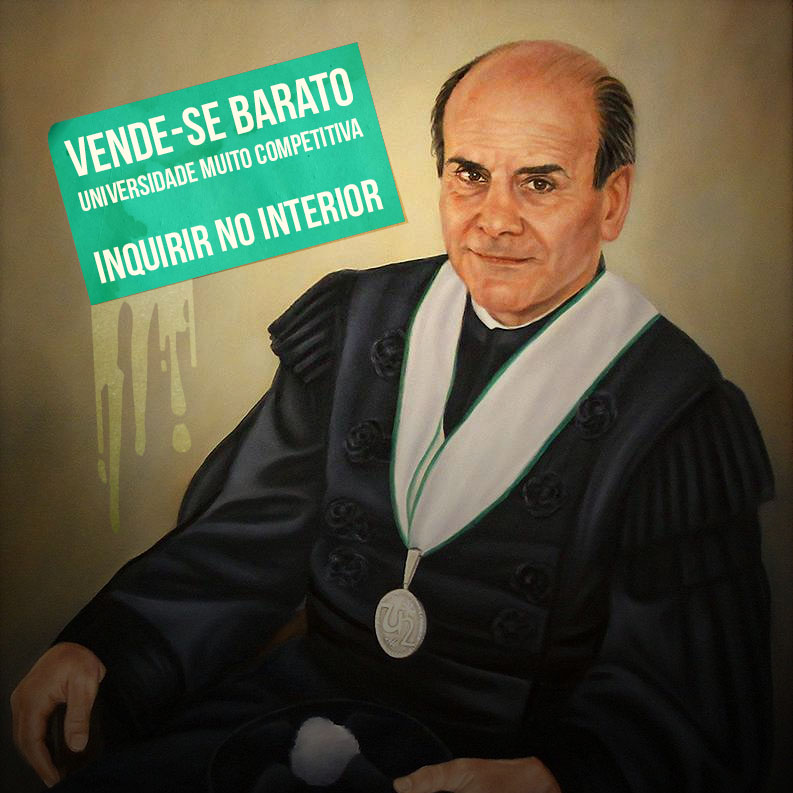Portugal // NOVA SBE – The seaside neoliberal faculty~ 10 min

A big project is being born next to the São Julião da Barra Fort in Carcavelos. It’s described as a product of a big appeal to “civil society” while having almost no public contribution. It’s almost ready. It’s the new campus of the Faculty of Economics of the Nova University of Lisbon. Let’s just call it NOVA SBE (School of Business and Economics) – not because doing so will grant it increased respectability at the international level, but in order to save us a few characters.
The new installations were financed through an online campaign – The Campaign for NOVA SBE. It was launched by the Alfredo de Sousa Foundation, a private entity created for the financing and management of the campus. Its main purpose is to raise 50 million euros. With the exception of the land, which was handed over by the City Hall of Cascais, its financing was based on two kinds of contributions: individual ones, from the students, former students and respectable citizens; and corporate ones, through entities such as corporations and private foundations.
The classes started on the 3rd of September and the official inauguration will happen on the 29th. However, the funds raised are still below the necessary. There’s still 7 million euros to raise and this has led the faculty to take some desperate measures. On August 9, the Observador newspaper published a “report” which appeared to have the sole purpose of advertising the project and encouraging financial contributions. Looking carefully, we can see that the article was explicitly sponsored by the Alfredo de Sousa Foundation and by NOVA SBE. So far, nothing too surprising.
However, there are reports of even more original approaches: students and alumni were contacted by the faculty via e-mail and phone call to ask them to contribute financially to the project. The current moment is described as “historical” and it’s promised that all contributions will be rewarded with at least a glorious presence of the donor’s name in the Donors Wall. The contribution is still optional, but the contacts are frequent. If a student doesn’t answer a phone call, they might receive an email with the information they didn’t want to hear on the phone.
An email received just after an unsuccessful phone contact on the 23rd of August:
Dear [student’s name]
I tried calling the [student’s phone number], but to no avail.
I would like to share with you that the official inauguration of the NOVA SBE’s new campus in Carcavelos will happen on the 29th of September. This is just one of the necessary steps to conquer and consolidate the position of our school as an education brand of reference at the global level. Hopefully we can count on you to be at the inauguration. You can sign up here.
This project is made possible thanks to the support of more than 1.025 individual partners and 38 corporate partners, which have donated +41M€ altogether. This is an historical result for a campaign in Portugal, which however does not total the necessary 50M€. We would like to have you on our Donors Wall. More details about this project are available here.
Any questions you might have, you can contact us.
Thank you.
Facebook post published on the 23rd of August by a former student after a phone contact:
I just received a phone call from NOVA SBE to donate money for the construction of the new campus. Since I hung up the phone call, I still received two emails with the information that I didn’t want to hear. As it turns out, they still don’t have the 50M € and are asking the former students and institutions [for donations]. Apparently the 20.000 € for my masters degree wasn’t enough, which fortunately someone paid for me, because I didn’t have the money and neither should I have to. As in turns out, Santander, Jerónimo Martins, Amorim, and the freakin’ 1% who are depositing their interests in our education aren’t enough. The education which has food courts, the education which has networking halls, the education which has professional makeup stands. The education which has everything, minus democracy, inclusion and gratuitousness. For lack of better words: get a clue, you clowns.
“Seize this once-in-a-lifetime opportunity right now!”
The minimal contribution starts at 50 euros. However, bigger donations might land the name of the donor in the Walk of Founders, in park benches, connection zones, meeting rooms, classrooms, auditoriums, and other spaces. It all depends on the number of zeros on the donation.
In the list of “founding partners” of the Alfredo de Sousa Foundation, we can see the City Hall of Cascais, NOVA SBE, Santander, Jerónimo Martins and Teresa e Alexandre Soares dos Santos. These were joined by 33 other “corporate partners” such as Nestlé, Cisco, LG and others. Said entities can also see their names on some of the faculty spaces. These include the Jerónimo Martins Grand Auditorium, which will be the main auditorium; the Teresa e Alexandre Soares dos Santos Library; and the Santander Academic Hall, the masters building.
Besides being responsible for the construction of the campus, the Alfredo de Sousa Foundation will also have responsibilities in its management and financing, along with corporate relations.
We will thus have a private foundation managing and financing a public college.
How did we get here?
The model chosen for the management of this new campus, with private entities holding some of the faculty’s most important positions, didn’t come out of nowhere. It’s the product of a series of reforms undertaken in the last few decades and part of a framework of neoliberal policies. These make it possible and apparently imperative for private institutions to enter public faculties such as NOVA SBE. with the intention of making profit.
A critical and detailed look at this whole process would give us material to do a series of articles. We shall skip doing so for now. However, there are some interesting particularities about this case. NOVA SBE isn’t just a pawn in this game. It has taken an active role in the making of the rules. The history of the emergence in the late 70’s of neoliberal ideas in Portugal merges with the founding of this faculty. At the time of its opening in 1978, the majority of the Founding Committee of the Faculty of Economics of the Nova University of Lisbon and of the faculty’s staff had majored outside of Portugal. A significant part of them did their PhDs in the US or had been greatly influenced by American theoretical doctrines. They had certain political views in common. Namely, a belief in the virtues of reducing and reconfiguring the State’s intervention in the economy – neoliberalism.
In a workshop about “Teaching and Practices of the Open Macroeconomics after April” João Rodrigues (pag. 54 to 63) analyses the changes in economics teaching between the 70’s and the 90’s. He shows how a considerable part of the founding board members of the faculty have had great influence in the proliferation and political implementation of neoliberalism in Portugal. Either by having access to a platform in mainstream media or by holding important positions in economic policy decision making – such as in the Bank of Portugal, Government, IMF and the World Bank. Some of the more infamous names are Cavaco Silva (former Prime-Minister), Miguel Beleza (former Governor of the Bank of Portugal and Finance Minister) and Jorge Braga de Macedo (former IMF staffer and Finance Minister) .
At the scientific level, NOVA SBE was essential for the affirmation of neoclassical doctrine in curricular plans. It had the particularity of refusing to accept any other economic doctrines which were taught in other institutions at the time. 40 years have passed since then and the influence of this vision in the teaching of economics is still remarkable. The “Colectivo Economia Plural” (Plural Economy Collective) in the Lisbon School of Economics and Management of the University of Lisbon and the “Colectivo Economia sem Muros” (Economy without Walls Collective) in the NOVA SBE think that a culture of single thought is cultivated with an obvious ideological skew. In opposition to this reality, they demand a more plural and critical education.
The current economics curriculum seems to have been designed for the formation of uncritical technicians, ready-made to ingress into the bureaucratic apparatus of the State or in a big multinational. This happens when the financing of universities relies more and more on private entities. It wasn’t an accident.
NOVA SBE: the model for the neoliberal university
NOVA SBE emerges simultaneously as the precursor and the consequence of neoliberalism in Portugal. The new campus appears to be the materialization of the neoliberal project for education in the form of concrete blocks by the seaside. We already mentioned some of its consequences for the curriculum offer. Let’s look again at the faculty model in construction to understand what kind of project we are dealing with.
In it, the market will certainly offer the best solutions to the student’s problems. The management of the student accommodations must be left to the most experienced and recognized company in the market. That’s why the university residence’s most accessible rooms will cost 545€ per month. An amount just below the Portuguese minimum wage.
To be internationally competitive and have a presence in university rankings must be a priority for an institution like this. That’s why the masters tuition costs at least 11.000€. That’s also why the students must pay 1.000€ just to guarantee attendance for the academic year.
But the real world is a competitive place where talent and hard-work must be rewarded. That’s why there also exists a Fellowship for Excellence program which was created to recognize the students’ academic merits. However, if you can’t be bothered to have any merit, a small contribution of 12.300€ for the construction of the new campus guarantees direct access to the program.
The State’s intervention in the management of the universities must be reduced to the strictly necessary minimum. The campus construction must be secured only by the contributions of the “civil society” – with a little gift of land by the State. The market will do the rest alone. That’s why there is now a 7 million euro hole in the construction budget and why they have to harass present and former students, repeatedly if necessary, in a desperate attempt to make them donate.
As you might know, the NOVA SBE has already moved definitely to Carcavelos – perhaps the most modern campus in Europe. 30 years and many classes later, we leave behind the Campolide School, but not before we celebrate it properly in the great Alumni Party ‘17.
What may have seemed an Impossible Mission has become real. In the last four years we were surprised by the generosity of our former students, from 39 companies who became partners, and from more than a 100 people who, without having any apparent relation with the school, believed in the importance of this project for Portugal and decided to support it. It is with great pride that we see our Donors Wall growing daily while today the first names were engraved in the Walk of Founders in the school’s entrance.
But we still have 8M € to reach the goal of 50M €. If possible, we would like for at least one in each ten students to support the project before the inauguration – to this day 6% are already donors. Regardless of the value, all donations are very important and can be made online here.
One of the campaign’s slogans is “Together, we are building the future”. Who is “us” and what “future” are they talking about? The one that ends with with a fence around all the institutions that manage public life, and hanging on that fence a sign which reads “Private Reservation of the Soares dos Santos family”?




